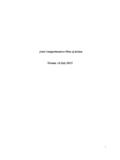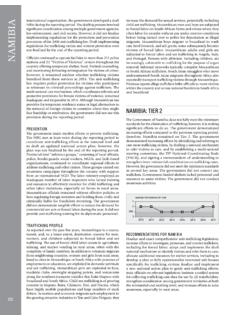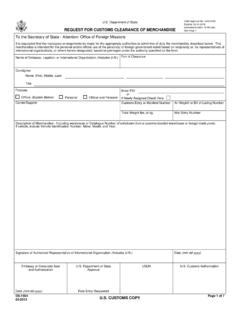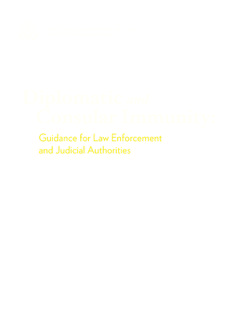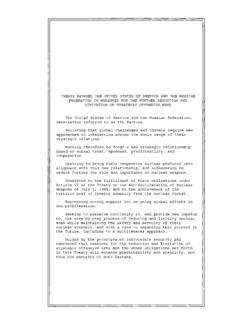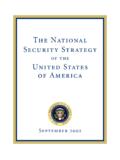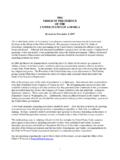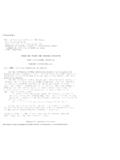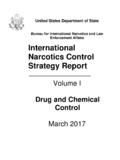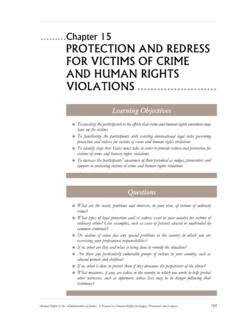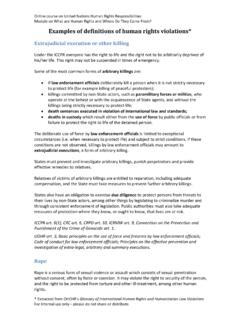Transcription of PHILIPPINES 2019 HUMAN RIGHTS REPORT
1 PHILIPPINES 2019 HUMAN RIGHTS REPORT EXECUTIVE SUMMARY The PHILIPPINES is a multiparty, constitutional republic with a bicameral legislature. President Rodrigo Roa Duterte, elected in May 2016, began his constitutionally limited six-year term in June 2016. Midterm elections in May for 12 (of 24 total) senators, all congressional representatives, and local government leaders were seen as generally free and fair, despite reports of violence and vote buying. The ruling party and allies won all 12 Senate seats and maintained a roughly two-thirds majority in the 306-seat House of Representatives. Barangay (village) and youth council elections originally scheduled for 2021 were rescheduled for December 5, 2022 so that local and national elections will occur in the same year.
2 The philippine National Police (PNP) is charged with maintaining internal security in most of the country and reports to the Department of the Interior. The Armed Forces of the PHILIPPINES (AFP), which reports to the Department of National Defense, is responsible for external security but also carries out domestic security functions in regions with a high incidence of conflict, particularly the Mindanao region. The two agencies share responsibility for counterterrorism and counterinsurgency operations. The PNP Special Action Force is responsible for urban counterterrorism operations. President Duterte s May 2017 declaration of martial law for the entire region of Mindanao and the Sulu Archipelago was extended until the end of the year, giving the military expanded powers in the area.
3 Governors, mayors, and other local officials have considerable influence over local police units, including appointment of top departmental and municipal police officers and the provision of resources. The government continued to support and arm civilian militias. The AFP controlled Civilian Armed Force Geographical Units (CAFGUs), while Civilian Volunteer Organizations (CVOs) fell under PNP command. These paramilitary units often received minimal training and were poorly monitored and regulated. Some political families and clan leaders, particularly in Mindanao, maintained private armies and, at times, recruited CVO and CAFGU members into those armies. Civilian control over security forces was not fully effective. Significant HUMAN RIGHTS issues included: unlawful or arbitrary killings, including extrajudicial killings, by and on behalf of the government and nonstate actors; reports of forced disappearance by and on behalf of the government and nonstate actors; torture by and on behalf of the government and nonstate actors; arbitrary detention by and on behalf of the government and nonstate actors; harsh and life- PHILIPPINES 2 Country Reports on HUMAN RIGHTS Practices for 2019 United States Department of State Bureau of Democracy, HUMAN RIGHTS and Labor threatening prison conditions; arbitrary and unlawful interference with privacy; significant problems with the independence of the judiciary.
4 The worst forms of restrictions on free expression and the press, including violence, threats of violence, and unjustified arrests or prosecutions of journalists, censorship, and the existence of criminal libel laws; corruption; and unlawful recruitment or use of child soldiers by terrorists and groups in rebellion against the government. The government investigated a limited number of reported HUMAN RIGHTS abuses, including abuses by its own forces, paramilitaries, and insurgent and terrorist groups. Concerns about police impunity continued following the increase in killings by police in 2016. Significant concerns also persisted about impunity for the security forces, civilian national and local government officials, and powerful business and commercial figures.
5 Slow judicial processes remained an obstacle to bringing government officials allegedly involved in HUMAN RIGHTS abuses to justice. Muslim separatists, communist insurgents, and terrorist groups continued to attack government security forces and civilians, causing displacement of civilians and resulting in the deaths of security force members and civilians. Terrorist organizations engaged in kidnappings for ransom, bombings of civilian targets, beheadings, and the use of child soldiers in combat or auxiliary roles. Section 1. Respect for the Integrity of the Person, Including Freedom from: a. Arbitrary Deprivation of Life and Other Unlawful or Politically Motivated Killings There were numerous reports government security agencies and their informal allies committed arbitrary or unlawful killings in connection with the government directed campaign against illegal drugs.
6 Killings of activists, judicial officials, local government leaders, and journalists by government allies, antigovernment insurgents, and unknown assailants also continued. The number of extrajudicial killings of all types in the country since 2016 may approach 30,000, according to some HUMAN RIGHTS nongovernmental organizations (NGOs). The approximately 30,000 antidrug operations conducted from September 2018 to June 2019 resulted in the deaths of over 600 civilians, according to government data. The Central Luzon region emerged as the new epicenter for drug-related killings, accounting for percent of drug-related killings in 2018. Media reported that some police officials allegedly involved in previous drug war killings in Metro Manila were transferred to Central Luzon, including the former Caloocan PHILIPPINES 3 Country Reports on HUMAN RIGHTS Practices for 2019 United States Department of State Bureau of Democracy, HUMAN RIGHTS and Labor City police chief, during whose tenure teenager Kian delos Santos was killed in 2017.
7 The reported number of extrajudicial killings varied widely, since government and NGOs used different definitions. The Commission on HUMAN RIGHTS (CHR), an independent government agency responsible for investigating possible HUMAN RIGHTS violations , investigated 914 new complaints of alleged extrajudicial or politically motivated killings involving 1,098 victims as of August, of which 782 were cases of drug-related extrajudicial killings involving 876 victims. The CHR suspected PNP or philippine Drug Enforcement Agency involvement in 550 of these new complaints and AFP or paramilitary personnel in two cases. The CHR attributed the higher number of extrajudicial killing investigations in the reporting period to an increase in investigations initiated on its own authority based on monitoring news reports, reports to the CHR in social media, staffing, or information received following CHR outreach efforts.
8 Killings were not limited to antidrug operations. Media quoted a member of congress claiming in June that 134 HUMAN RIGHTS defenders have been killed since President Duterte took office in 2016. In July some 20 killings on the island of Negros were attributed to political causes. Four police died in Ayungon town, allegedly killed by New People s Army rebels. A former leftist mayor also from Ayungon and two other leftist politicians from Canlaon City were killed; some alleged they died because of their opposition to President Duterte, although no suspects have been identified. Legal advocacy groups also expressed concern about attacks on judges, prosecutors, lawyers, and other legal professionals, alleging that dozens of legal professionals have been killed since the beginning of the Duterte administration and documenting lethal attacks against eight since January.
9 There was a widespread belief that police enjoyed impunity for killings. Many cases from previous years remained open. Of police officers involved in killings in the antidrug war since 2016, only three have been convicted of murder, in November 2018 for the 2017 murder of juvenile Kian delos Santos. President Duterte continued his anticrime campaign, specifically targeting the trafficking and abuse of illegal narcotics. Fatalities fell following a three-month suspension of the campaign in late 2017, but increased again beginning in 2018, although at a lower level than prior to the suspension, and continued at that level during the year. PHILIPPINES 4 Country Reports on HUMAN RIGHTS Practices for 2019 United States Department of State Bureau of Democracy, HUMAN RIGHTS and Labor Civil society organizations accused police of planting evidence, tampering with crime scenes, unlawfully disposing of the bodies of drug suspects, and other actions to cover up extrajudicial killings.
10 The CHR reported that the PNP refused to share information on investigations into police and vigilante killings, as required by the constitution and despite a 2018 Supreme Court ruling that the PNP must turn over the documents. In May the PNP stated it turned over 95 percent of the required records to the solicitor general. Most of the documents, however, did not contain information related to drug-related deaths. In September the Center for International Law, the legal group representing relatives of alleged drug war victims, filed a motion to place the Office of Solicitor General and PNP in contempt of court for failing to turn over the requested documents. President Duterte continued to maintain lists of persons he claimed were suspected drug criminals, including government, police, military, and judicial officials.

